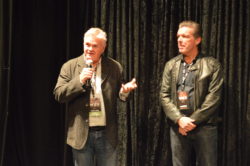WIFF marks 35 years since GM’s “Final Offer”

Sturla Gunnarsson, the director of the NFB’s “Final Offer” participates in a Q & A session moderate by WIFF board member and former “Windsor Star” managing editor Marty Beneteau during the 35th anniversary screening. (Photo by Ken Pastushyn.)
By Kenneth Pastushyn
The Windsor International Film Festival’s screening of Final Offer included special guests: former Canadian Auto Workers union presidents Buzz
Hargrove and Ken Lewenza along with former CAW vice president Gary Parent, who was also the former president of the Windsor Labour Council.
The 1985 Genie Award-winning documentary from the National Film Board of Canada chronicles the historic talks between General Motors and the Canadian sector of the United Auto Workers union in 1984. The C-UAW was led then by Bob White, who would go on to lead his membership out of the international union to form the CAW.
“Bob realized the historic significance of the moment and he realized that there was value in it for the union at this event being documented,” said Sturla Gunnarsson, director of Final Offer.
Gunnarsson introduced the film to the WIFF audience and took part in the Q & A session afterwards with Lewenza and Hargrove.
Moderating the Q & A session was Marty Beneteau, the former managing editor of the Windsor Star and a current board member of WIFF. Beneteau covered the talks in 1984 at the Royal York Hotel.
“Our paper felt that it was important because there was so much concentration of autoworkers here and the role of the union was so important to the community,” said Beneteau, who at the time also covered talks between the Big Three and the UAW as a 26-year-old labour reporter for the Windsor Star.
Both Beneteau and Hargrove, who was in charge of getting the paperwork done for White, can be spotted in a few of the scenes in Final Offer.
According to Hargrove, Gunnarsson originally intended Final Offer to be a film about collective bargaining and distributed to university labour and management schools across Canada – “and it is still being used today,” said Gunnarsson.
“Sturla had a great surprise and it turned out to be the biggest industrial company in the world and the second or third largest trade union in the world,” said Hargrove. “It became an internal struggle and interest was high. I’ll always remember the first screening of the film and we had a packed house and we knew we had a winner.”
That great dispute as seen in Final Offer was about the UAW agreeing with GM’s profit-sharing scheme while White and the Canadian autoworkers he represented wanted traditional wage increases. After many bitter debates, representatives for GM formally presented the “final offer” which were the wage increases White wanted. The membership approved the contracts, returned to their assembly lines and within six weeks proceedings began for the separation of Canadians from the UAW.
“I just want to end by saying this because it’s so important – that was 35 years ago and the reality is that we still debate annual wage increases in lieu of profit sharing,” said Lewenza. “So to this day, I’d still say the right decision in terms of putting money in our paycheques.”


